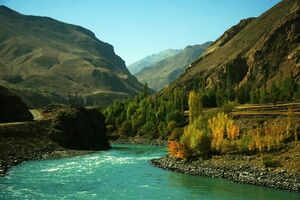Rusana
The Republic of Rusana is a sovereign state located in southern Alshar. Rusana has a land area of 794,582 km2 and is bordered by Corumm to the east, Canpei to the north, [ ] to the west and the Taizi Sea to the south. The population of Rusana is split almost evenly between urban and rural areas, with the capital city of Tabish being the undisputed center of economic activity. Rusana has seen human habitation for thousands of years and has been a battleground for several regional powers including the Oduniyyad caliphate and various Corummese dynasties. Its population is composed of a Rusani majority and various minorities such as the Tauqi and Kassar people and Corummese muslims known as Yue.
Republic of Rusana نوتستان من رو بخور | |
|---|---|
|
Flag | |
| Capital and largest city | Tabish |
| Ethnic groups |
|
| Demonym(s) | Rusani |
| Government | Unitary semi-presidential constitutional republic |
• Chief of State | Rostam Khosa |
| Legislature | National Assembly |
| Establishment | |
• ?? | ???? |
• ?? | ???? |
• ?? | ???? |
• ?? | ???? |
| Area | |
• Total | 794,582 km2 (306,790 sq mi) |
| Population | |
• 2020 estimate | 54,650,440 |
• Density | 69/km2 (178.7/sq mi) |
| Currency | Daric |
| Driving side | right |
| Calling code | +616 |
History
Kingdoms of Ghanim, Lakadu, and Barpubad
Chen-RusanI Wars
Following the disastrous defeat at the Battle of Horoz plain in 860, the kingdom of Ghanim fell into the sphere of the Chen dynasty. Emboldened by the victory at Horoz, the Chen dynasty initiated an invasion of Barpubad intending to gain the southern shore of lake Doyeon. As the Chen marched south in the direction of Barpubad's heartland, their enemy divided its forces into three separate armies, refusing to engage general Qu Hou's larger army in the open. After reducing several fortresses in late 861, Qu Hou marched on the Barpubad capital. The main Barpubadid army finally stood in his way to give battle at the village of Pasdar but unbeknownst to Qu Hou his army was being flanked from the east and the west by the other two formations. The initial battle went in favor of the larger Chen army but as it was close to overwhelming the Barpudadid infantry the auxiliary armies initiated their attack from the rear and eastern flank. The morale of the Chen collapsed upon being close to encirclement and a rout soon initiated. Qu Hou broke free of the trap with a few hundred horsemen and fled north while the bulk of the Chen infantry tried to flee west, only to get bogged down and picked off in the marshes. The defeat at the battle of Pasdar ended the Barpubad expedition and dented Chen military prestige altough Ghanim's own weakened position at the time precluded it taking advantage to throw off its vassal status.
Early Modern Period
Levantine Colonization
1650-1798 Kiravian explorers were the first "occidentals" to make contact with the peoples of modern Rusana however from their introduction in the 1500s to the establishment of the Martillian Protectorate over the Kingdom of Lakadu it was often overlooked compared to the riches of Corumm. The Ularien Trading Company of Martilles first established contact with the Kingdom of Lakadu in 1616. With Kiravias well established trade with Corumm for far eastern goods the Martilliens negotiated a treaty with the Lakadui to secure ports at first for raiding Kiravian shipping as it passed westerward, laden with Corummese goods but eventually the privateers sought more. They obverved the resentments that the Lakadui held for their neighbors in Barpubad and offered to supply them with mercenaries and to instruct their armies in the lessons learned from the Great Confessional War. Throughout the 1620s and 30s the Lakadui and Barpubadi clashed in minor skirmishes in which the Lakadui became increasingly victorious. While the Levantines did not offer a superiour military product their doctrine of war was so foreign to that part of the world that it proved shocking to the Barpubadi. In a series of violent battles the Lakadui made massive gains into the islands south of Barpubad's coast. These islands long contested between Barpubad and Corumm were captured and an emissary was dispatched to the Emperor's court and a back to the King in Lakadu. In a master stroke the Martillien mercenaries sold the inner ring of islands to Corumm and formally opened relations with that nation, and also demonstrated to the King of Lakadu what could be achieved if he remanded more power to the Martilliens. In this masterstroke the Martilliens secured their future in the region and became friendly with the greatest power in Alshar, Corumm. Whereas the Kiravians were merely traders, the Martilliens offered concrete results to the Imperial Corummese Court. In 1650, the Kingdom of Lakadu was formalized as a protectorate of the Duchy of Martilles. This was only possible by brokering a treaty with the Corummese Court that recognized its sovereignty and promised to support Corumm in the event of an invasion from Barpudad, Ghanim, or the as yet unexplored Tanhai. For as long as the southeast coast Levantines maintained colonies in the area they respected this treaty, one of the only in that time.
The Burgundian Ularien Trading Company arrived in the area in 1705.
With the Great Slavery Revolt on the western shores of Alshar the various colonial administrators had to make a choice as the revolt became a full-scale war, one that the Levantine colonists were losing badly. Would they cast their lot in with their fellow colonists, draining the defensive resources from their own colonies, ignore the plight of their brethren, try to balance both, or abandon their colonial ambitions altogether. The viceroy of Pyrithi Colony attempted to find a balance.
20th century
Unification of Rusana
First Corummese Invasion
Second Corummese Invasion
Kushim Event
21st Century
Civil War
Third Corummese Invasion
Geography

The climate of Rusana varies from tropical to temperate, with semi-arid conditions in the coastal south. There is a monsoon season with frequent flooding due to heavy rainfall, and a dry season with significantly less rainfall. There are four distinct seasons in Rusana: a cool, dry winter from December through February; a hot, dry spring from March through May; the summer rainy season, or southwest monsoon period, from June through September; and the retreating monsoon period of October and November. Rainfall can vary greatly from year to year, and patterns of alternate flooding and drought are not uncommon. The geography of Rusana is varied but much of it is dominated by the xxx mountain range that begin in the north and cleave through the central area of the nation, with only the coast being relatively flat.
Politics

| Leader | Party | Seats |
| Afsar Gorshani | Jamaat-e-Islami (Alliance for Prosperity) | 45 |
| Marjan Abidi | Movement for Islamic Renewal (Alliance for Prosperity) | 40 |
| Qadir Bhatti | Islamic Call Party (Alliance for Prosperity) | 12 |
| Mirwais Baqri | Party of God (Alliance for Prosperity) | 5 |
| Rostam Khosa | Rusana Patriotic Alliance (Builder's Alliance) | 152 |
| Semu Taqvi | Movement For Progress (Builder's Alliance) | 31 |
| Babar Gasul | Kassar Front (Builder's Alliance) | 15 |
Rusana follows the traditional republican system with three separate branches; an executive led by a Chief of State, an unicameral legislative and the judiciary represented by the Supreme Islamic Court. The Chief of State is elected through nationwide elections, every five years and has wide powers over military, economic affairs and foreign policy. Legislative power rests with the Rusani National Assembly or Rusani Majles, with each of the country's 150 districts having two seats, renewed by election every three years.
Current Rusana politics are divided between two electoral alliances, the conservative Alliance for Prosperity and the relatively moderate Builder's Alliance supported by most ethnic and religious minorities.
Society & Culture
Ethnic Groups
wip
Major Tribes
Culture
wip
Economy
pomegranates and sand
